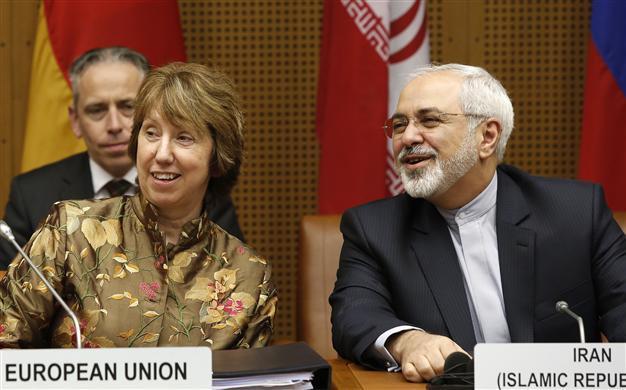Iran nuclear talks enter sensitive new phase
VIENNA - Agence France-Presse

Vice President of the European Commission Catherine Margaret Ashton (L) and Iranian Foreign Minister Javad Mohammad Zarif attend the so called EU 5+1 Talks with Iran at the UN headquarters in Vienna, on May 14, 2014. AFP Photo
Diplomatic efforts by Iran and world powers towards a potentially historic nuclear deal entered uncharted territory Wednesday as a new round of talks started in Vienna.
After three meetings that Washington says have enabled both sides to "understand each other's positions", the negotiators aim this time to start drafting the actual text of an accord.
Success could resolve one of the most intractable geopolitical problems of the 21st century, but failure might plunge the Middle East into conflict and start a regional nuclear arms race.
"If the odds of the talks collapsing are high, the stakes of failure are higher," Ali Vaez, Iran analyst at the International Crisis Group, told AFP. "Time is of the essence."
The five permanent members of the UN Security Council plus Germany want Iran to reduce in scope its nuclear programme so as to make any dash to build an atomic bomb virtually impossible.
In return the Islamic republic, which says its nuclear activities are purely peaceful, wants the lifting of all UN and Western sanctions, which have hit its economy hard.
Iran's Foreign Minister Mohammad Javad Zarif, installed by bridge-building new President Hassan Rouhani last year, said after the last round in early April that there was agreement on "50-60 percent" of issues.
But with both sides sticking to the mantra that "nothing is agreed until everything is agreed" -- one US negotiator likened the process to a "Rubik's Cube" -- this is not enough.
Arriving in Vienna Tuesday, both Iran and the United States sought to dampen expectations that a deal was within easy reach, with Zarif saying a "lot of effort" was still required.
A senior US official said the talks would be "very, very difficult" and that there were still "significant gaps" between the two sides and a "range of complicated issues" to tackle.
"We do not know if Iran will be able to make the tough decisions they must to assure the world that they will not obtain a nuclear weapon and that their programme is for entirely peaceful purposes," the official said.
She added that optimism raised in some quarters has "gotten way out of control".
The parties aim to build on an interim deal struck in Geneva in November under which Iran froze certain activities for six months in return for minor sanctions relief. This expires on July 20.
One major issue, the Arak reactor, appears to have been resolved, with Iran indicating the design could be modified to ease concerns that it could produce weapons-grade plutonium.
But others, most notably uranium enrichment and the sequence of sanctions relief "could be harder to bridge," Kelsey Davenport from the Arms Control Association told AFP.
Iran already has enough of low-enriched material for several bombs if it decided to "break out" and use its 20,000 so-called centrifuges to enrich this stockpile to weapons-grade.
The powers may therefore want Iran to slash the number of centrifuges, or to cap output per machine, but this may be a hard sell for hardliners in Iran where enrichment is a source of great national pride.
"Discussions on enrichment are and will be difficult," French Foreign Minister Laurent Fabius said on Monday.
Other tricky issues include Iran's development of new centrifuges that it claims can enrich many times faster than the current models, and tougher inspections by the UN atomic watchdog.
Also of concern are Iran's ballistic missiles, which could carry nuclear warheads -- it denies wanting atomic weapons -- and its answers to questions about past alleged "military dimensions" to its nuclear work.
"Iran continues to deceive the world and advance its nuclear programme," Israeli Prime Minister Benjamin Netanyahu, whose country is widely believed to have nuclear weapons itself, said late Tuesday in Japan.
"Clearly the Ayatollahs cannot be trusted," he added, saying that "rogue state" Iran was passing nuclear technology to North Korea.
